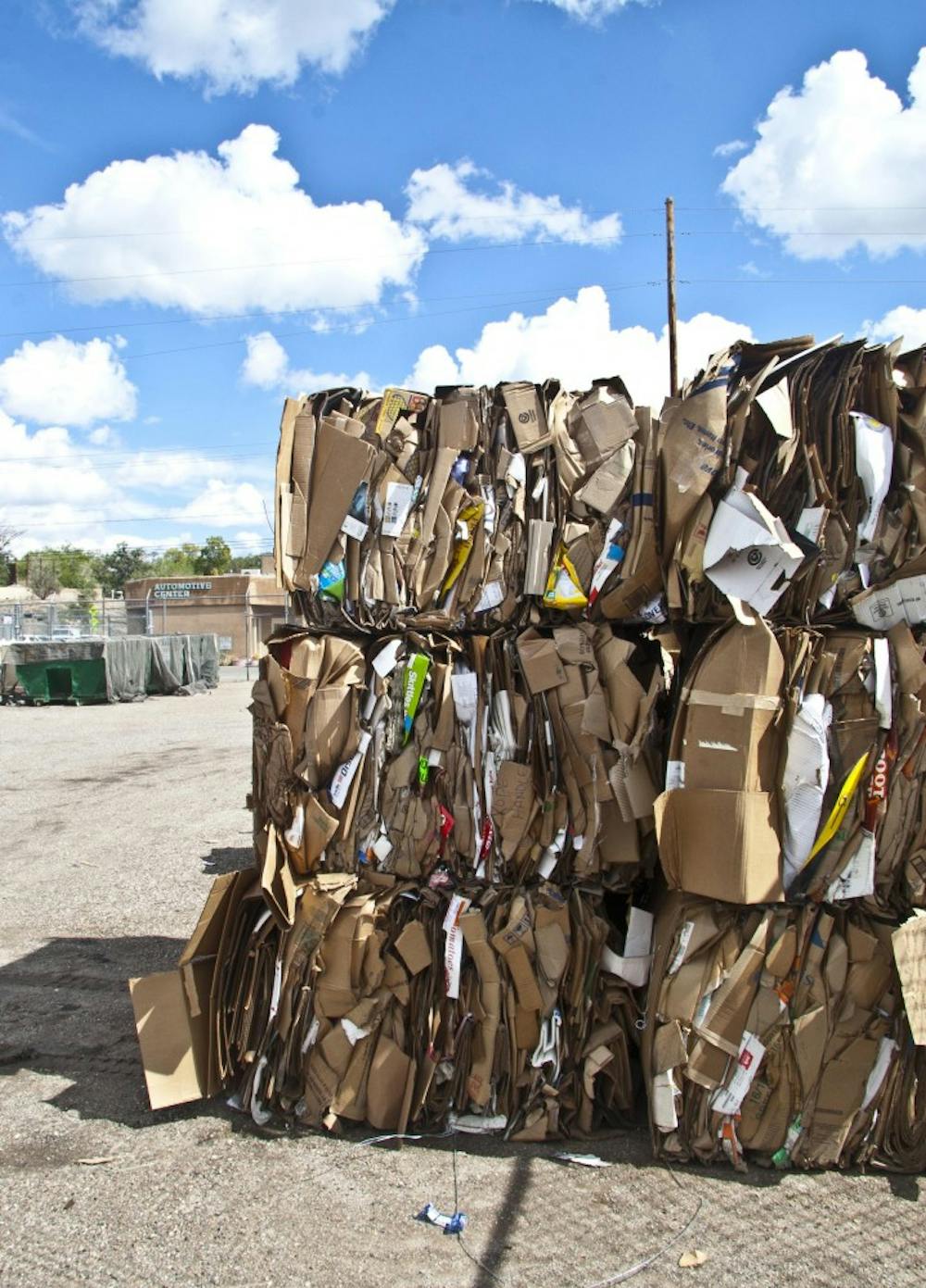The desolate sand lot is empty except for a vehicle in the corner and a couple green dumpsters lining the chain link fence. Closer to the loading dock hundreds of bags of glistening soda cans sit in the sun next to a pile of junk – old cassettes, metal hangers, an upside-down sign for the UNM Safety, Health and Environmental Affairs Department. Surrounded by other physical plant departments on all sides along Avenida de Servicio on north campus, one would never guess that the UNM Recycling Department was unique.
The UNM Recycling Department has a 35 percent diversion rate, which means the University recycles 35 percent of its recyclable waste, said Linda McCormick, resource conservation manager of recycling at UNM.
She said the rate is remarkable given that recycling is not obligatory, and that the city of Albuquerque has a diversion rate of around 11 percent, and the national average is around 33 percent. She said she loves that recycling has become a normal service, similar to taking out the trash.
“Now it’s spread out all over the campus, and it’s still voluntary, but it seems more like a service,” McCormick said.
“It’s an unfortunate analogy, but it’s like the trash or heating or cooling, so it’s neat to see the change from something really special to ‘Well, doesn’t everyone recycle?’”
She said because no law mandates recycling, the city offers a free recycling service to encourage more people to adopt the practice.
Trash service, on the other hand, costs money.
“As much as you’re decreasing your trash you’re decreasing your cost, but still there’s no recycling police,” she said. “They’re not going to come to your house and say, ‘You threw away a teabag when that could have been composted.’”
McCormick said the process of reuse is integral to our relationship with the natural world and how society consumes products.
“Recycling is conservation; you use much less money because you don’t have to dig the ore out of the ground.” she said. “It only takes say 20 percent of the energy to recycle a can than to build it from new. Fuel doesn’t have to be used to dig stuff up, you don’t have to transport the ore to the crusher so it saves energy; it saves resources.”
Contrary to common belief, she said it is often less expensive to make products out of recyclables than it is to create a product from scratch. The recycling plant also has the added benefit of employing a larger workforce.
“Landfill produces one job and recycling produces 17 jobs,” she said. “It’s good for people, it’s good for the environment, good economics, there’s a lot of good in it.”
Get content from The Daily Lobo delivered to your inbox
The plant recycles a variety of materials, such as cardboard, paper, aluminum cans, wood pallets, No. 1 and No. 2 plastics, iron, copper, printer toners and CDs. McCormick said there is no limit on what the department can or can’t recycle; it is constantly adding more materials to its facility. It started by just recycling paper and it is about to start recycling fluorescent light bulbs and No. 5 plastics.
“If I can see a lot of it going in the trash I’ll try to find a home for it,” she said. “There’s nothing too small that we won’t try and recycle it. We could just say we’re just going to do bottles and cans but let’s stretch, let’s see what more we can bring into the recycling arena.”
Recycling technician Karla Chavez said bonds she formed with others is the most enjoyable part of the job for her. She’s made new friends just from picking up people’s recycling, she said.
“You go to the hospital and everybody does their job, they’re serious,” she said. “But you start chit-chatting and they’re like, ‘Hey you! Karla!’ and I’m like, ‘Woah someone knows my name, where’s my name tag?’”
Reusable Office Supplies and Equipment, or ROSE, is one of McCormick’s most recent projects. For it, she saves any school supplies that come through the plant, and puts them out on a table on main campus for others to take.
“Why should students have to pay 4 or 5 dollars for a three ring binder when I get them by the hundreds throughout the year,” she said.
Chavez said students are the ones who have the most interaction and interest in the recycling facility.
“Students are the ones coming here and getting more information about it, not the departments,” she said. “The departments just want somewhere to throw out their trash, to just get rid of it and not see it.”
McCormick said while she has lofty goals for the recycling plant, the simplicity of her tasks at the plant has a beauty in itself.
“Sometimes I just want something mindless,” she said. “I can’t deal with anything today, so I’m going to bail cardboard or I’m going to separate bottles and cans.”






